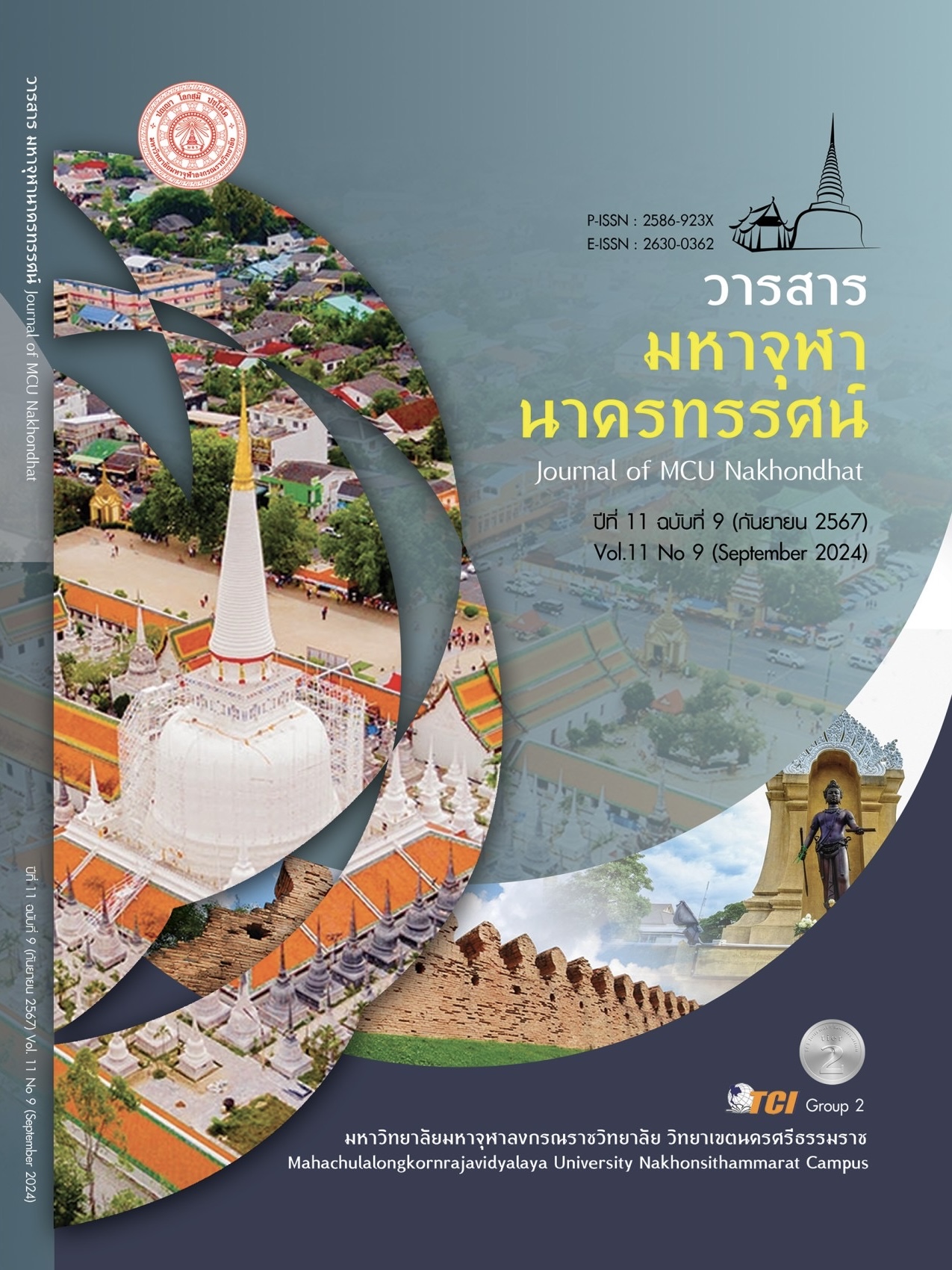AN APPLICATION OF IDDHIPADA PRINCIPLE IN THE MANAGEMENT OF THE ANNUAL PORTHAN'S DAY ACTIVITIES, WAT THAMMAKHOS, SINGNAKORN DISTRICT, SONGKHLA PROVINCE
Main Article Content
Abstract
The objectives of this research paper are 1) To study the concept in the management of the annual Porthan's Day activities, 2) To investigate Iddhipada Principles in the Theravada Buddhist scriptures, and 3) To apply the Iddhipada Principles in the Management of the Annual Porthan's Day activities, Wat Thammakhos, Singnakorn District, Songkhla Province. It is a qualitative research. The researcher will survey and collect data through in-depth interviews. The data will be analyzed, summarized, and presented in a descriptive writing format. Findings were as follows: 1) Management is the science and art that is the process of the organization to succeed and is considered an important component in the development and creation of unity together to solve problems and develop potential among the group unity is strength. When members are highly united, the organization will achieve its goals. 2) Iddhipada Iddhipada is the dhamma principle leading to success or the way to success consisting of chanda (Intention), viriya (effort), citta (thoughts), vimana (investigation), Training people to have morality according to the Iddhipada principle that is a process to manage, correct or improve according to the process and can be applied in self-development and various tasks. 3) Regarding the application of the Iddhipada principle in the management of the annual Porthan's Day activities, Wat Thammakhos, Singnakorn District, Songkhla Province, it was found that the principle is effective and applicable in solving planning problems, lack of generosity, and conflict resolution, and applying the Iddhipada principle to enable activities to take place to effectively achieve the desired goals and to be able to live together happily in the community
Article Details

This work is licensed under a Creative Commons Attribution-NonCommercial-NoDerivatives 4.0 International License.
References
นิพนธ์ โอภาษี. (2557). “การบริหารงานตามหลักอิทธิบาท 4 ขององค์การบริหารส่วนตำบลห้วยถั่วเหนือ อำเภอหนองบัว จังหวัดนครสวรรค์”. ใน วิทยานิพนธ์พุทธศาสตรมหาบัณฑิต สาขาวิชาพุทธศาสนา. มหาวิทยาลัย มหาจุฬาลงกรณราชวิทยาลัย.
บุญมี วิทยาสิทธิ์. (2560). “การประยุกต์หลักอิทธิบาท 4 ในการบริหารสถานศึกษาขั้นพื้นฐาน สังกัดสำนักงานเขตพื้นที่การศึกษามัธยมศึกษา เขต 25”. ใน วิทยานิพนธ์พุทธศาสตรมหาบัณฑิต สาขาวิชาพุทธบริหารการศึกษา. มหาวิทยาลัยมหาจุฬาลงกรณราชวิทยาลัย.
พระธรรมโกศาจารย์ (ประยูร ธมฺมจิตฺโต). (2549). พุทธวิธีในการบริหาร. กรุงเทพมหานคร: โรงพิมพ์มหาจุฬาลงกรณราชวิทยาลัย.
พระมหาธราธิป วรวิชโย (วรสายัณห์). (2560). การพัฒนาการจัดการเรียนการสอนด้วยหลักอิทธิบาท 4 ในโรงเรียนพระปริยัติธรรมแผนกสามัญศึกษาจังหวัดเพชรบูรณ์. ใน วิทยานิพนธ์ครุศาสตรมหาบัณฑิต สาขาวิชาการบริหารการศึกษา. มหาวิทยาลัยมหาจุฬาลงกรณราชวิทยาลัย.
พระมหาบรรจง ติสรโณ (ศรีสุข). (2560). “ศึกษาการประยุกต์ใช้หลักอิทธิบาทธรรม 4 ในการจัดการเรียนการสอนของโรงเรียนปริยัติคุณรสวิทยา อำเภอเมืองสุรินทร์ จังหวัดสุรินทร์”. ใน วิทยานิพนธ์พุทธศาสตรมหาบัณฑิต สาขาวิชาพระพุทธศาสนา. มหาวิทยาลัยมหาจุฬาลงกรณราชวิทยาลัย.
พระสมุห์พงศธร ปภงฺกโร (ทุมชะ). (2564). “การประยุกต์ใช้หลักอิทธิบาท 4 การบริหารงานของเทศบาลกุดจับ อำเภอกุดจับ จังหวัดอุดรธานี”. ใน วิทยานิพนธ์พุทธศาสตร์มหาบัณฑิต สาขาวิชาพระพุทธศาสนา. มหาวิทยาลัยมหาจุฬาลงกรณราชวิทยาลัย.
พระสุทธิพงษ์ สุเมธโส (งอกลาภ). (2561). การบริหารสถานศึกษายุค 4.0 ตามหลักอิทธิบาท 4 สังกัดสำนักงานเขตพื้นที่การศึกษามัธยมศึกษาเขต 30. ใน วิทยานิพนธ์พุทธศาสตรมหาบัณฑิต สาขาวิชาพุทธบริหารการศึกษา. มหาวิทยาลัยมหาจุฬาลงกรณราชวิทยาลัย.
พุทธทาสภิกขุ. (2537). ฆราวาสธรรม. (พิมพ์ครั้งที่ 4). กรุงเทพมหานคร: สุขภาพใจ.
มหาจุฬาลงกรณราชวิทยาลัย. (2539). พระไตรปิฎกภาษาไทยฉบับมหาจุฬาลงกรณราชวิทยาลัย. กรุงเทพมหานคร: โรงพิมพ์มหาจุฬาลงกรณราชวิทยาลัย.
สมคิด บางโม. (2561). องค์การและการจัดการ. กรุงเทพมหานคร: บริษัทวิทยพัฒน์ จำกัด.
สุทธิพงษ์ ศรีวิชัย. (2560). “หลักการบริหารการศึกษาตามแนวพุทธศาสตร์”. ใน สารนิพนธ์พุทธศาสตรมหาบัณฑิต สาขาวิชาพุทธบริหารการศึกษา. มหาวิทยาลัยมหาจุฬาลงกรณราชวิทยาลัย.


